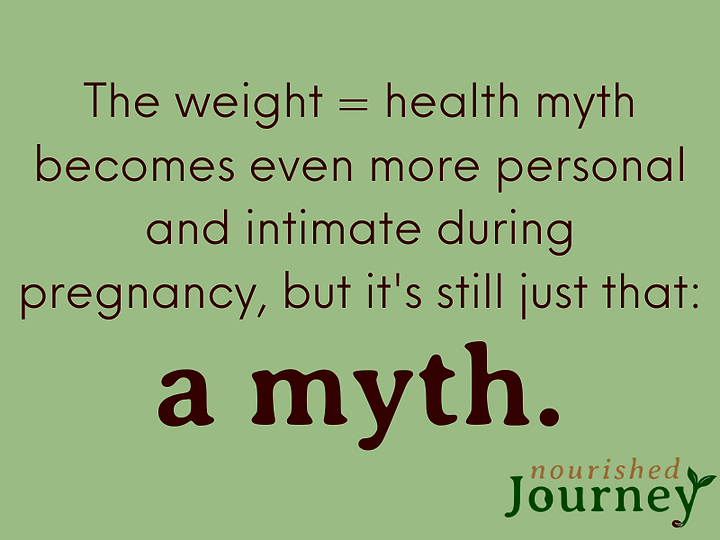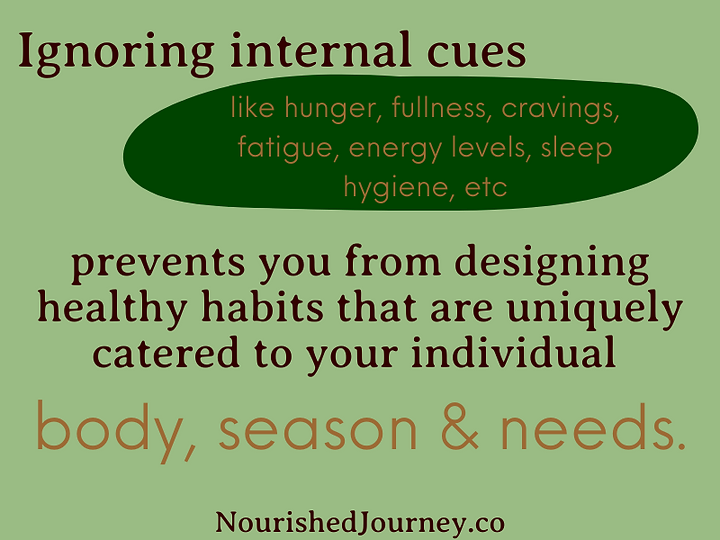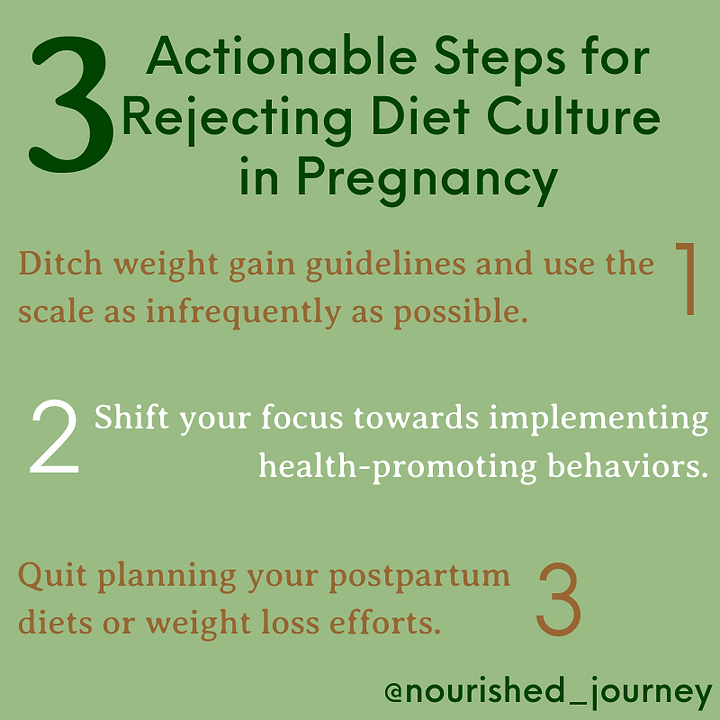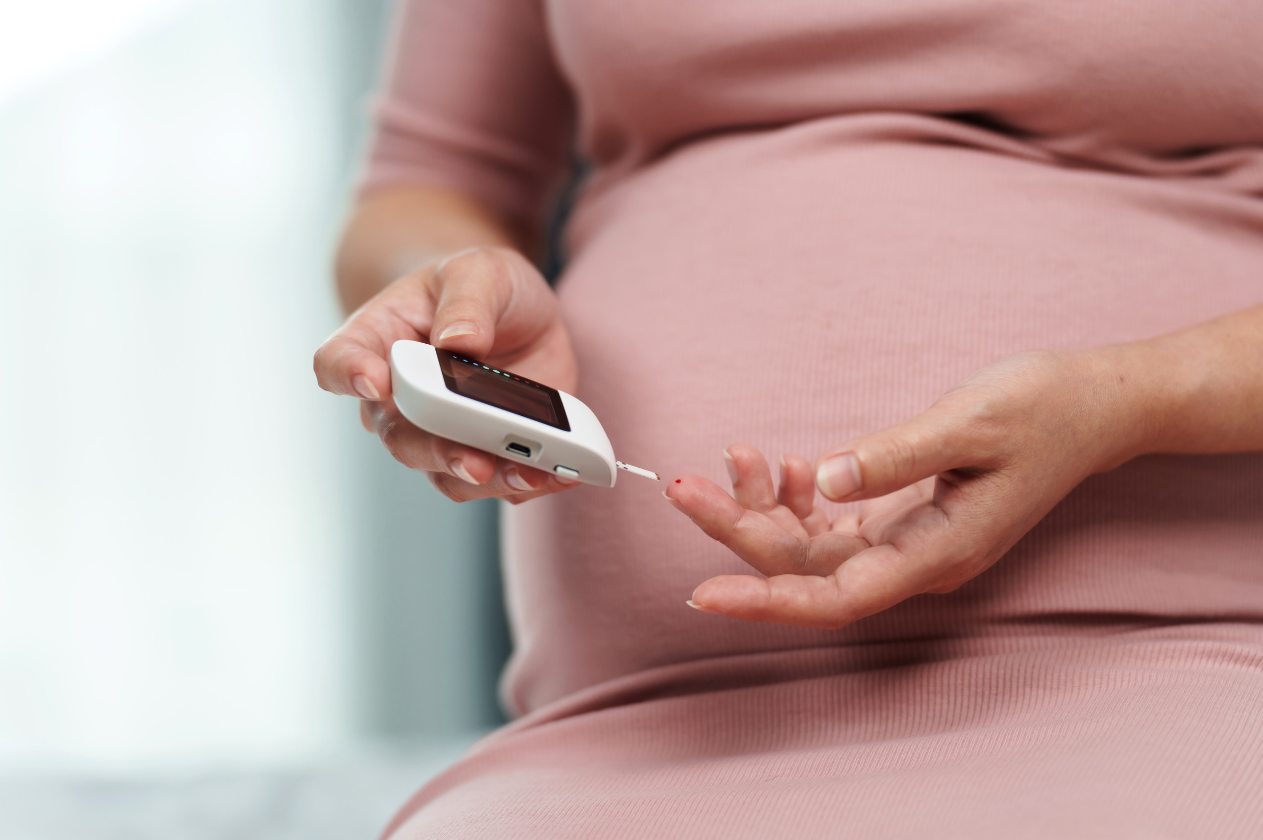Diet culture is so pervasive throughout our society, it’s no surprise that it is highly influential in pregnancy and postpartum conversations and healthcare. In fact, the amount of targeted advertising and messaging that gets directed at women before, during and after pregnancy related to bodies, weight stigma, diets and workout programs is really heartbreaking. I love the work I get to do with prenatal and postpartum women, but outside of working with clients one-on-one, I wanted to provide some tips and suggestions to anyone who might need them. So today on the blog, I’m diving into diet culture in pregnancy, what red flags to look out for, what you can do to work on rejecting diet culture during pregnancy and why it’s as good a time as ever to focus on healing your relationship with food and your body.
How does diet culture show up in pregnancy?
Anything from weight gain guidelines in your provider’s office to comments from strangers about your body represent the hurtful messaging of diet culture. It’s common for prenatal providers to give you an “ideal weight gain range” for your pregnancy and to comment on weight throughout your pregnancy. It’s likely you’ll get comments from people (both strangers and loved ones) related to your body. Even well-intentioned comments can reinforce the fatphobic idea that a smaller body is a better body and that you are healthier or better at a smaller size. You may get warnings from people like “be careful about all that weight gain!” or people may think they’re being funny and conversational by encouraging you to “eat for two while you can!” as if only pregnancy is a valid justification for honoring your hunger and cravings and eating adequately to nourish your body.
Diet culture may also show up during pregnancy in the form of a lot of extra food advice, warnings or rules. Yes, there are some food safety recommendations that you should be aware of so that you can keep yourself and baby safe, but as far as food rules that are meant to help you “manage” your weight or gain the “right” amount of weight, these are unnecessary and destructive to building or maintaining a healthy relationship with your body and with food.
If you manage to escape the weight-related comments or advice from others, it’s possible you will still feel a self-inflicted pressure to maintain a certain range of weight gain during pregnancy. The weight equals health myth becomes even more personal and intimate during pregnancy; now it’s not just your health but also the health of your baby that feels like your responsibility, and culture tries to convince us that our weight is somehow indicative of or causative of either poor or great health. Here is your gentle and loving reminder from a nutrition professional that weight does not equate to health. For any given person, there are a variety of amounts of weight gain that will all result in healthy, uncomplicated pregnancies and healthy babies. Graphs may show a steady, perfectly straight line for your “ideal weight gain” during pregnancy, but this is unrealistic for most people. Remember how unique every human body is. Think about how different each face is on every person you know or see on the street. Now apply that same diversity to bodies and weight gain during pregnancy. It’s simply crazy to think that everyone’s weight gain is going to follow an identical trend and amount per week.

Some other reminders:
- It’s normal and expected to gain weight during pregnancy, you are growing new organs and a new human!
- You will not always gain weight at a steady rate throughout pregnancy.
- Some people lose weight early in pregnancy due to nausea, vomiting, food aversions or other symptoms.
- Some people gain weight earlier in their pregnancy.
- Weight gain does not indicate how healthy your baby will be.
Red flags that may indicate the influence of diet culture
If you…
- use the scale daily
- track weight gain obsessively
- closely count calories
- would say you are trying to be “careful” about your weight
- exercise specifically to burn calories, to manage or limit weight gain
- follow an eating plan or diet that limits portions, foods you can eat or times you can eat
…these are all red flags.
These are indications that diet culture has influenced your relationship with your body. Obsessing about your body shape, size or weight or following external cues (diets and exercise plans) to determine how to eat or exercise are representative of a weight-centric, fatphobic approach that is not truly health promoting for you as an individual. For starters, the stress this puts on your mind and body isn’t good for you and baby. Secondly, ignoring internal cues (like hunger, fullness, cravings, fatigue, energy levels, sleep hygiene, etc) prevents you from designing healthy habits that are uniquely catered to your individual body, season and needs. These red flags indicate there is likely some work you could do on healing your relationship with food and your body that would benefit your health not just now, but over the long-term.

How you can reject diet culture during pregnancy
I know it may feel like an extra-difficult time to begin working on your relationship with your body, but I want to encourage you that a new type of self-care centered, body-respecting health journey can begin at any time. It IS possible to transition away from even subtle diet-y thoughts like “being careful” or “watching your calories”. It IS possible to shift the focus of your health efforts away from body manipulation or weight management and towards…
- Figuring out foods that make you feel good
- Finding what nourishes your body and your baby
- Learning how to listen to internal cues, like hunger and fullness
- Experimenting to determine what foods give you energy and stamina
- Modifying eating patterns to manage heartburn or other pregnancy side effects
- Helping your body manage GDM (gestational diabetes mellitus)
- Finding movement that feels good for your body
Here are THREE actionable steps you can take to reject diet culture during your pregnancy:
1. Ditch weight gain guidelines. Unless you are managing a specific health condition where water retention may fluctuate to the extent that regular at-home weight measurements are necessary to assess your status, stop weighing yourself. Don’t measure yourself against those guidelines. They are rooted in the BMI, which is inherently fatphobic and racist and was never created with pregnant women in mind. Additionally, you can ask your provider not to weigh you at every single appointment or to at least do a blind weight, meaning you don’t see what the scale says, they just document it for their charts and then don’t discuss it with you. If you feel lost about how to broach this subject, here’s an example of a phrase you can use: “It’s really triggering for me to see my weight going up, can you not tell me the number or not weigh me today?”
2. Shift your focus away from weight and towards health-promoting behaviors. This is something you can do both individually AND as a collaborative effort with any and all of your healthcare providers. It is fully within your rights to ask that your provider gives you shame-free, ethical healthcare by not centering any health conversations around your body shape, size or weight, and instead discussing interventions (behaviors, treatments, medications, etc) that are within your control. When you are creating health related goals, ask yourself, “Would I do this if it had absolutely zero impact on my body shape/size/weight?” and if the answer is NO, then you can ditch that idea. Instead, choose something else that you are pursuing for its value in being health-promoting, not body-controlling.
3. Quit planning your postpartum diets or weight loss efforts. Shut down any thoughts like “I’ll worry about it after I have the baby.” This may feel like it’s embracing your body now, but you’re setting yourself up for a difficult postpartum season of putting unrealistic expectations on your body that aren’t health-promoting, but stress- and shame-inducing. What can you do now? Focus on self care and health promoting behaviors that do NOT revolve around managing or losing weight, counting calories, burning calories, getting a particular body shape or size, etc. Consider journaling or meditating on what your body is going through physically. Develop a daily gratitude practice so you get in the habit of thanking your body. Prioritize nourishing your body and then continue this effort once the baby has arrived. Whether you are breastfeeding or not, your own nourishment and hydration are critical for your healing and health. This mindset shift- towards nourishing and away from dieting- is a valuable long term investment in yourself- in your physical, mental and emotional health!

If the idea of a pregnancy NOT centered around weight and body size is appealing to you, but you still feel lost in knowing how to pursue that experience, I’d love for you to reach out and schedule a discovery call to chat about what I do and how we could work together on your prenatal health journey.




 Hi! I’m Emily.
Hi! I’m Emily.

0 Comments